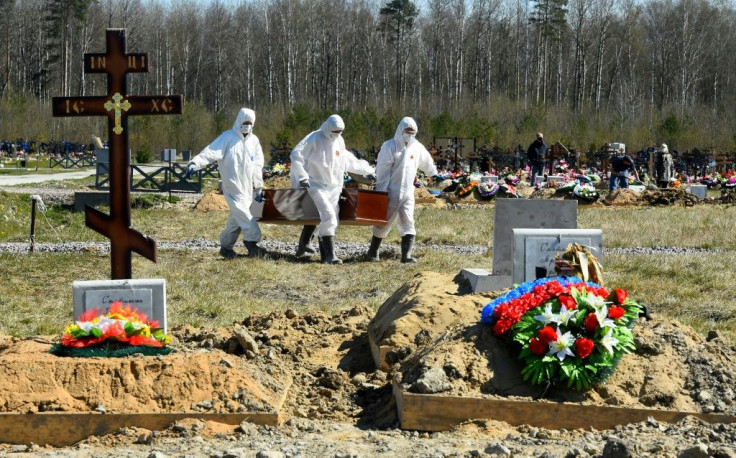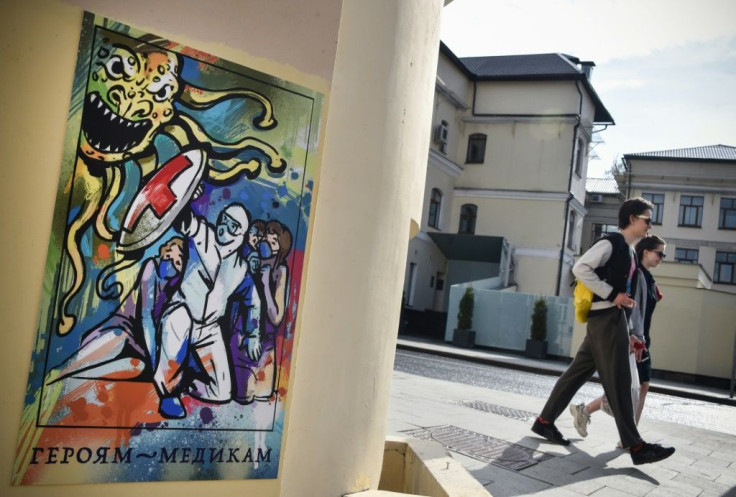Disputes Over Count As Russia Vaunts Low Virus Death Toll

As Russia's number of confirmed coronavirus cases reaches new highs, its official death toll remains remarkably low compared to other European countries.
Officials credit mass testing for identifying large numbers of people with only mild symptoms, but some say the discrepancy is due to how the death count is calculated.
"If someone dies of a heart attack but has been diagnosed with COVID-19, the official cause of death will be heart attack," said Sergei Timonin from Moscow's Higher School of Economics.
"In other words, not all deaths of those with coronavirus will be listed as deaths from coronavirus," said Timonin, deputy head of the university's International Laboratory for Population and Health.
As of Wednesday, Russia ranked sixth in the world for virus cases with 165,929 confirmed infections. But it has reported only 1,537 deaths -- a rate of 0.9 percent that is far lower than in the other top 10 countries.
By comparison, Germany, often lauded for its health service's response to the virus, has declared a death rate of 4.2 percent.
Russians have widely disputed the figures, prompting the health ministry and the public health watchdog Rospotrebnadzor this week to insist the numbers reflect the country's rapid response to the pandemic.
Rospotrebnadzor noted in a statement that "Russia is in second place in the world in terms of numbers of tests at more than 4.46 million," behind the United States.
It said this allowed Russia to "identify and quickly isolate patients with mild forms as well as those without symptoms, which significantly lowered the spread of the virus among the public and in certain risk groups."
While there are some doubts over their reliability, virus tests are widely available in Moscow through private laboratory companies and clinics.
Since the end of last month, internet giant Yandex has also offered free at-home tests.
A Rospotrebnadzor official who asked to remain anonymous told AFP that the low infection rate among over-65s demonstrated the success of Russia's strategy.

Moscow in particular ordered those over 65 not to leave their homes at all in mid-March.
"Russia has done its best to delay the epidemic's peak: we closed our borders and immediately started monitoring those infected," said Yevgeny Timakov, a doctor specialising in infectious diseases who advises the health ministry.
He says Russia gained a few weeks to prepare for the pandemic, "isolate those at risk and organise hospital beds".
He predicts the final death rate among Russia's cases will be around three percent or "a third of that in Europe."
But lack of transparency over how the deaths are recorded casts doubt on the numbers.
Local media has in recent weeks reported cases where the cause of death was recorded as pneumonia, despite the deceased having tested positive for coronavirus.
That's what happened to Anastasia Petrova, a 36-year-old journalist who died in the Urals city of Perm on March 31.
Her cause of death was recorded as "double pneumonia" and it was only officially changed to coronavirus when one of her friends spoke out, saying she had tested positive two days before her death.
The first coronavirus fatality in Russia, a 79-year-old woman, was announced on March 19 by Moscow Mayor Sergei Sobyanin.
Later that day the authorities changed their account, however, saying an autopsy showed the cause of death to be a blood clot, not the virus.
This happens because in Russia "an autopsy is almost always obligatory and the cause of death is recorded after the autopsy", said Timonin.
"It will only be at the end of May when the April statistics come out that we'll see the true death count from COVID-19 in Russia," he said.
© Copyright AFP 2024. All rights reserved.





















